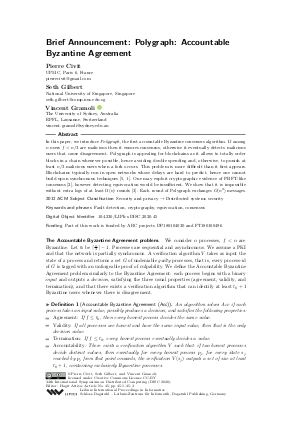Brief Announcement: Polygraph: Accountable Byzantine Agreement
Authors
Pierre Civit,
Seth Gilbert,
Vincent Gramoli 
-
Part of:
Volume:
34th International Symposium on Distributed Computing (DISC 2020)
Part of: Series: Leibniz International Proceedings in Informatics (LIPIcs)
Part of: Conference: International Symposium on Distributed Computing (DISC) - License:
 Creative Commons Attribution 3.0 Unported license
Creative Commons Attribution 3.0 Unported license
- Publication Date: 2020-10-07
File

PDF
LIPIcs.DISC.2020.45.pdf
- Filesize: 448 kB
- 3 pages
Document Identifiers
Subject Classification
ACM Subject Classification
- Security and privacy → Distributed systems security
Keywords
- Fault detection
- cryptography
- equivocation
- consensus
Metrics
- Access Statistics
-
Total Accesses (updated on a weekly basis)
0Document
0Metadata
Abstract
In this paper, we introduce Polygraph, the first accountable Byzantine consensus algorithm. If among n users f < n/3 are malicious then it ensures consensus, otherwise it eventually detects malicious users that cause disagreement. Polygraph is appealing for blockchains as it allows to totally order blocks in a chain whenever possible, hence avoiding double spending and, otherwise, to punish at least n/3 malicious users when a fork occurs. This problem is more difficult than it first appears. Blockchains typically run in open networks whose delays are hard to predict, hence one cannot build upon synchronous techniques [Andreas Haeberlen et al., 2007; Vitalik Buterin and Virgil Griffith, 2019]. One may exploit cryptographic evidence of PBFT-like consensus [Miguel Castro and Barbara Liskov, 2002], however detecting equivocation would be insufficient. We show that it is impossible without extra logs of at least Ω(n) rounds [Pierre Civit et al., 2019]. Each round of Polygraph exchanges O(n²) messages.
Cite As Get BibTex
Pierre Civit, Seth Gilbert, and Vincent Gramoli. Brief Announcement: Polygraph: Accountable Byzantine Agreement. In 34th International Symposium on Distributed Computing (DISC 2020). Leibniz International Proceedings in Informatics (LIPIcs), Volume 179, pp. 45:1-45:3, Schloss Dagstuhl – Leibniz-Zentrum für Informatik (2020)
https://doi.org/10.4230/LIPIcs.DISC.2020.45
BibTex
@InProceedings{civit_et_al:LIPIcs.DISC.2020.45,
author = {Civit, Pierre and Gilbert, Seth and Gramoli, Vincent},
title = {{Brief Announcement: Polygraph: Accountable Byzantine Agreement}},
booktitle = {34th International Symposium on Distributed Computing (DISC 2020)},
pages = {45:1--45:3},
series = {Leibniz International Proceedings in Informatics (LIPIcs)},
ISBN = {978-3-95977-168-9},
ISSN = {1868-8969},
year = {2020},
volume = {179},
editor = {Attiya, Hagit},
publisher = {Schloss Dagstuhl -- Leibniz-Zentrum f{\"u}r Informatik},
address = {Dagstuhl, Germany},
URL = {https://drops.dagstuhl.de/entities/document/10.4230/LIPIcs.DISC.2020.45},
URN = {urn:nbn:de:0030-drops-131236},
doi = {10.4230/LIPIcs.DISC.2020.45},
annote = {Keywords: Fault detection, cryptography, equivocation, consensus}
}
Author Details
Funding
Part of this work is funded by ARC projects DP180104030 and FT180100496.
References
- Vitalik Buterin and Virgil Griffith. Casper the friendly finality gadget. Technical Report 1710.09437v4, arXiv, January 2019. URL: http://arxiv.org/abs/1710.09437v4.
-
Miguel Castro and Barbara Liskov. Practical Byzantine fault tolerance and proactive recovery. ACM Transactions on Computer Systems, 20(4), 2002.

- Pierre Civit, Seth Gilbert, and Vincent Gramoli. Polygraph: Accountable Byzantine consensus. In Workshop on Verification of Distributed Systems (VDS), June 2019. Available at URL: https://eprint.iacr.org/2019/587.pdf.
- Tyler Crain, Vincent Gramoli, Mikel Larrea, and Michel Raynal. DBFT: Efficient leaderless Byzantine consensus and its applications to blockchains. In IEEE NCA, 2018. URL: http://gramoli.redbellyblockchain.io/web/doc/pubs/DBFT-preprint.pdf.
-
Andreas Haeberlen, Petr Kouznetsov, and Peter Druschel. PeerReview: Practical accountability for distributed systems. SOSP, 2007.

